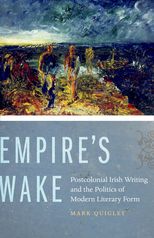Empire's Wake: Postcolonial Irish Writing and the Politics of Modern Literary Form
Empire's Wake: Postcolonial Irish Writing and the Politics of Modern Literary Form
Assistant Professor of English
Cite
Abstract
Though Irish contributions to literary modernism are well known, Irish modernism tends to be framed through narrow treatments of Joyce, Yeats, and the Revival as “cosmopolitan” writers detached from a wider Irish intellectual and cultural history and a consideration of Irish literature’s role in modernism’s ongoing development. Empire’s Wake significantly broadens conventional understandings of Irish modernism and postmodernism by tracing how a distinctly postcolonial late modernism emerges within Irish literature between the late 1920s and the 1950s to contest and extend key aspects of modernist thought and aesthetic innovation at the very moment that high modernism is consolidating its influence and prestige. Countering critical portraits of the era as one of aesthetic stagnation, the book argues that a late modernist sensibility animates postcolonial Irish writing across a range of literary registers running from the Gaelic autobiographies of the remote Blasket Islands to Samuel Beckett’s radical re-imaginings of the modern novel. Continuing, then, to resituate Irish modernism and postmodernism within the contexts of the lively political, intellectual, and cultural debates marking Irish postcoloniality’s distinct phases from the 1920s to the 1990s “Celtic Tiger” era, the book draws on the work of Samuel Beckett, Sean O’Faoláin, Frank McCourt and the Blasket autobiographers to complicate and enhance our assessments of the legacies of Joyce and the Revival and challenge conventional notions of a singular “global modernism” emerging in the aftermath of empire.
-
Front Matter
- Introduction. Rerouting Irish Modernism: Postcolonial Aesthetics and the Imperative of Cosmopolitanism
- One Modernity's Edge: Speaking Silence on the Blaskets
- Two Sean O’Faoláin and the End of Republican Realism
- Three Unnaming the Subject: Samuel Beckett and Postcolonial Absence
- Four Postmodern Blaguardry: Frank McCourt, the Celtic Tiger, and the Ashes of History
- Conclusion: Dispatches from the Modernist Frontier: “European and Asiatic papers please copy”
-
End Matter
Sign in
Personal account
- Sign in with email/username & password
- Get email alerts
- Save searches
- Purchase content
- Activate your purchase/trial code
Institutional access
-
Sign in through your institution
- Sign in with a library card Sign in with username/password Recommend to your librarian
Institutional account management
Sign in as administratorPurchase
Our books are available by subscription or purchase to libraries and institutions.
Purchasing information| Month: | Total Views: |
|---|---|
| March 2023 | 1 |
| October 2023 | 1 |
| January 2024 | 2 |
| January 2024 | 2 |
| January 2024 | 2 |
| January 2024 | 2 |
| January 2024 | 2 |
| January 2024 | 2 |
| January 2024 | 2 |
| January 2024 | 2 |
| February 2024 | 1 |
| March 2024 | 2 |



Get help with access
Institutional access
Access to content on Oxford Academic is often provided through institutional subscriptions and purchases. If you are a member of an institution with an active account, you may be able to access content in one of the following ways:
IP based access
Typically, access is provided across an institutional network to a range of IP addresses. This authentication occurs automatically, and it is not possible to sign out of an IP authenticated account.
Sign in through your institution
Choose this option to get remote access when outside your institution. Shibboleth/Open Athens technology is used to provide single sign-on between your institution’s website and Oxford Academic.
If your institution is not listed or you cannot sign in to your institution’s website, please contact your librarian or administrator.
Sign in with a library card
Enter your library card number to sign in. If you cannot sign in, please contact your librarian.
Society Members
Society member access to a journal is achieved in one of the following ways:
Sign in through society site
Many societies offer single sign-on between the society website and Oxford Academic. If you see ‘Sign in through society site’ in the sign in pane within a journal:
If you do not have a society account or have forgotten your username or password, please contact your society.
Sign in using a personal account
Some societies use Oxford Academic personal accounts to provide access to their members. See below.
Personal account
A personal account can be used to get email alerts, save searches, purchase content, and activate subscriptions.
Some societies use Oxford Academic personal accounts to provide access to their members.
Viewing your signed in accounts
Click the account icon in the top right to:
Signed in but can't access content
Oxford Academic is home to a wide variety of products. The institutional subscription may not cover the content that you are trying to access. If you believe you should have access to that content, please contact your librarian.
Institutional account management
For librarians and administrators, your personal account also provides access to institutional account management. Here you will find options to view and activate subscriptions, manage institutional settings and access options, access usage statistics, and more.